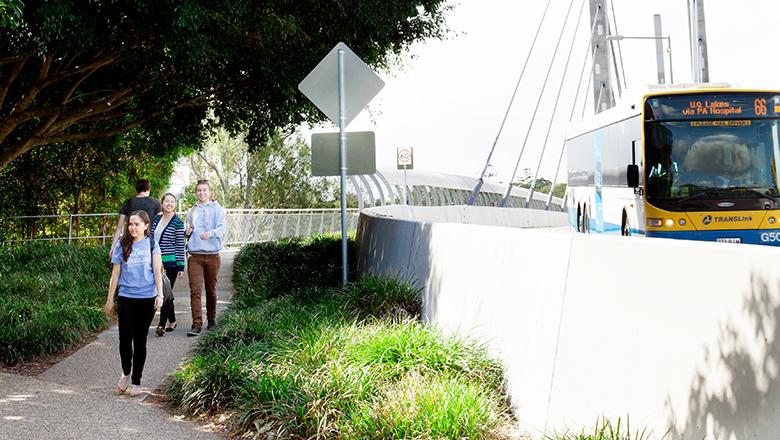The transition from high school to university is an important milestone. It can be a daunting and exciting time as your teen experiences increased independence and finds their feet in an entirely different environment.
You may be feeling worried and even a little saddened by the prospect of taking a step back from your teen’s day-to-day activities. Whether they’re moving away from home or not, this is a chance for them to create a new social circle and explore different aspects of their identity.
Things that you had some element of control over during your child’s high school years will now be their sole responsibility. It's up to them to manage their attendance, timetable and communication with their tutors.
This increased responsibility may be a little overwhelming for your teen if they’re accustomed to you stepping in to manage these aspects of their studies. It’s therefore important for you to take the time to help prepare your teen for these changes, as well as other shifts in their everyday life, should they be moving out of home.
Don't forget that the transition to university life is just as important as preparing your teen for university study. Uni life is all about making new friends and developing opinions, attitudes and habits that will shape your teen as an adult.
We’ve put together a list of practical ways you can help your teen transition to university.
Is your teen starting at UQ soon? Share our guide to settling in and orientation with them.
Finances
Cost of living is a big factor for many teens when it comes to deciding whether to move out of home to attend university. Of course, many young people will need to relocate to go to uni in a different city, state or even country. Regardless of whether your child knows they’re going to move out or not, having a candid discussion about finances is vital for a smooth transition to university. Study fees and the cost of textbooks, transport and food all need to be considered.
Be transparent with your teen about if and how you can support them financially, and what this means for them regarding finding scholarships or securing casual or part-time work.
UQ has over 500 scholarships and grants for coursework students. Browse our scholarships to discover what’s available for your teen.
Sit down with your teen and work out a realistic budget. Be sure to factor in due dates for unavoidable costs such as everyday bills (phone, internet, electricity if applicable), and help them find cost-efficient alternatives such as second-hand textbooks.
Being proactive about finances will help set your teen up for success as they move into the world of adulthood – while avoiding any costly surprises.
There are several loan schemes available to undergraduate students at UQ. Find out more about fees and financial support.

UQ Gatton's Dining Hall offers tasty and affordable buffet-style meals for students daily.
Time management
Getting through Year 12 exams no doubt taught your teen a thing or two about time management. They may already have experience maintaining a study schedule and juggling school, social and extracurricular activities, perhaps even alongside a casual job.
For the first time, however, your teen will be able to schedule their own timetable. This is incredibly convenient but can also be daunting. Being unprepared or not knowing what to expect when signing up for class times can make the transition to university quite difficult. So, it's important for your teen to understand the uni timetabling and class allocation process.
Have an open conversation with your teen about what they want to prioritise in their first year at university and discuss their preferred study habits. For example, if you know your teen is a late riser and studies more productively in the evening, suggest they enrol in afternoon classes.
Be sure to speak with them about leaving enough time between classes for breaks and to get to different parts of campus. Squishing all their classes back-to-back in a two-day block, while convenient for those who have casual or part-time jobs, can quickly get exhausting and lead to burnout. Encourage your teen to take it steady in their first year by creating a timetable that will help them gradually transition to university life.
Share these handy apps with your teen to help them organise their time with a balance between study, household chores and social activities.
Getting around
Figuring out how to get to, from and around campus can require more investigation than you might think. Discuss the most cost-effective and convenient method for your teen to get to uni by considering the following:
- How competitive is it to get a carpark on campus?
- What public transport links are available near your teen’s place of residence?
- How much does parking cost vs public transport?
- How long will it take to get to uni via car vs public transport?
- If it’s a lengthy commute, can your teen make better use of their time by studying on public transport?
Help your teen understand their parking options and organise the parking permits and public transport cards they need before Semester 1 starts. This will help ease some of the stress involved in the transition to university. Don’t forget to apply for student concessions for public transport.
Encourage them to take a campus tour during orientation week and familiarise themselves with the buildings their classes will be in. Alternatively, they can go on a virtual tour ahead of time. This will help them to feel more confident during their first week of classes.
Downloading the UQ Maps app will help your teen get around campus hassle-free.

UQ St Lucia campus is conveniently serviced by more than 10 direct bus routes from the Brisbane CBD and outer suburbs.
Social events
In many cases, your teen will be moving from a secure and comfortable friendship group established in high school, to a completely new environment where they may not know anyone. This can be an overwhelming prospect and may cause feelings of anxiety about meeting new people.
If your teen is worried about first impressions and how to connect with new people, remember to reassure them that most first-year students will be in the same boat. It's OK to feel a bit awkward.
Encourage your teen to check out the university’s clubs and societies during orientation week. They might find it easier to talk to people with similar interests to their own, and it’s a great gateway into uni social life.
UQ Union have over 200 clubs and societies ranging from the Drones and RC Club to the K-pop Dance Club.
The first semester of university can be a time when teens really lean into partying and drinking culture as they experience the full independence of adulthood. Be sure to discuss topics such as responsible drinking and consent with your teen, and make sure they know who to call in an emergency.
It can be easy to get swept up in party mode, especially if your teen is living on campus in the middle of it all. Reiterate that while social events are a vital part of the transition to university life, they need to be balanced with study.
Checking in
Whether your teen is living at home or not, remember to check in and see how they are coping with the transition from high school to university. Ask them if there’s anything you can help with to make their transition smoother. They may have suggestions other than those we have covered above.
If your teen is living away from home, you may wish to establish regular check-ins that will provide some structure to their new life. Make sure you let them know they can call or message you any time. Speaking with you or friends from high school may provide some comfort when they’re feeling homesick.
Is your teen still unsure whether they want to move out of home to attend uni? Go through this pros and cons list about moving out with them.





